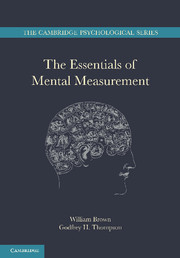Book contents
- Frontmatter
- PREFACE
- Contents
- ERRATA
- PART I PSYCHOPHYSICS
- PART II CORRELATION
- CHAPTER V INTRODUCTION TO CORRELATION
- CHAPTER VI THE MATHEMATICAL THEORY OF CORRELATION
- CHAPTER VII THE INFLUENCE OF SELECTION
- CHAPTER VIII THE CORRECTION OF RAW CORRELATION COEFFICIENTS
- CHAPTER IX THE THEORY OF GENERAL ABILITY
- CHAPTER X A SAMPLING THEORY OF ABILITY
- CHAPTER XI THE PRESENT POSITION (1924)
- CHAPTER XII THE MATHEMATICAL AND EXPERIMENTAL EVIDENCE FOR THE EXISTENCE OF A CENTRAL INTELLECTIVE FACTOR (g)
- CHAPTER XIII A TEST OF THE THEORY OF TWO FACTORS
- CHAPTER XIV RECENT DEVELOPMENTS OF STATISTICAL METHOD IN PSYCHOLOGY
- CHAPTER XV THE FACTORIAL ANALYSIS OF ABILITY
- APPENDIX I TABLES
- APPENDIX II A LIST OF DEFINITE INTEGRALS OF FREQUENT OCCURRENCE IN PROBABILITY WORK
- INDEX
CHAPTER X - A SAMPLING THEORY OF ABILITY
from PART II - CORRELATION
Published online by Cambridge University Press: 05 June 2016
- Frontmatter
- PREFACE
- Contents
- ERRATA
- PART I PSYCHOPHYSICS
- PART II CORRELATION
- CHAPTER V INTRODUCTION TO CORRELATION
- CHAPTER VI THE MATHEMATICAL THEORY OF CORRELATION
- CHAPTER VII THE INFLUENCE OF SELECTION
- CHAPTER VIII THE CORRECTION OF RAW CORRELATION COEFFICIENTS
- CHAPTER IX THE THEORY OF GENERAL ABILITY
- CHAPTER X A SAMPLING THEORY OF ABILITY
- CHAPTER XI THE PRESENT POSITION (1924)
- CHAPTER XII THE MATHEMATICAL AND EXPERIMENTAL EVIDENCE FOR THE EXISTENCE OF A CENTRAL INTELLECTIVE FACTOR (g)
- CHAPTER XIII A TEST OF THE THEORY OF TWO FACTORS
- CHAPTER XIV RECENT DEVELOPMENTS OF STATISTICAL METHOD IN PSYCHOLOGY
- CHAPTER XV THE FACTORIAL ANALYSIS OF ABILITY
- APPENDIX I TABLES
- APPENDIX II A LIST OF DEFINITE INTEGRALS OF FREQUENT OCCURRENCE IN PROBABILITY WORK
- INDEX
Summary
The case against the validity of Professor Spearman's argument—Hierarchical order produced by random overlap of group factors, without any general factor— Application of the “criterion” to these cases, apparently proving the presence of a general factor—The erroneous nature of the “criterion”—Hierarchical order the natural order among correlation coefficients—A sampling theory of ability—Transfer of training—Conclusions.
THE CASE AGAINST THE VALIDITY OF PROFESSOB SPEARMAN'S ARGUMENT
As we have already seen in previous chapters, it is possible, by means of dice throws or in other ways, to make artificial experiments on correlation, with the immense advantage that the machinery producing the correlation is known, and that therefore conclusions based upon the correlation coefficients can be confronted with the facts. Working on these lines, one of us made, in 1914, a set of imitation “mental tests” (really dice throws of a complicated kind), which were known to contain no General Factor. The correlations were produced by a number of Group Factors which were of wide range, and, unlike Professor Spearman's Specific or Narrow Group Factors, they were not mutually exclusive.
These imitation mental tests, containing no General Factor, gave however a set of correlation coefficients in excellent hierarchical order, and the criterion was when calculated found to be unity, so that had these correlation coefficients been published as the result of experimental work, they would have been claimed by Professor Spearman as proving the presence of a General Factor. In a short reply Professor Spearman laid stress on the fact that this arrangement of Group Factors which thus produced practically perfect hierarchical order was not a random arrangement, that it was exceedingly improbable that this one special arrangement should have occurred in each of the psychological researches of many experimenters, so improbable indeed as to be ruled entirely out of court, and that a random arrangement of Group Factors, though it might give some hierarchical order, would not give it in the perfection actually found. The obvious way to find out if this is so or not is to try it, with artificial “mental tests” formed of dice throws. This was done in November and December of 1918, after an unavoidable delay of some years.
- Type
- Chapter
- Information
- The Essentials of Mental Measurement , pp. 174 - 192Publisher: Cambridge University PressPrint publication year: 2013



